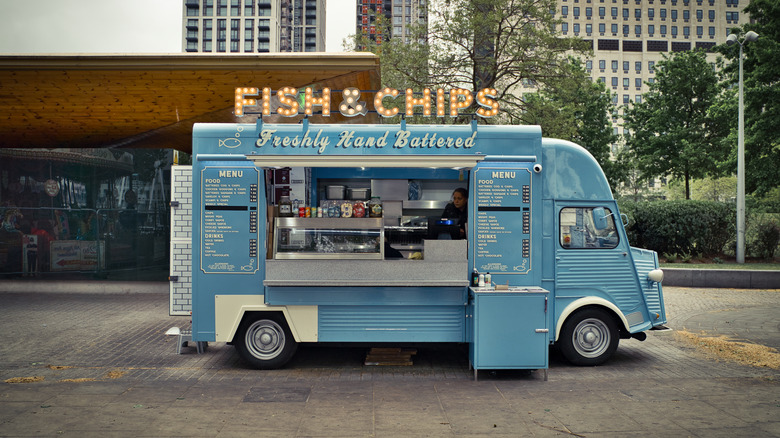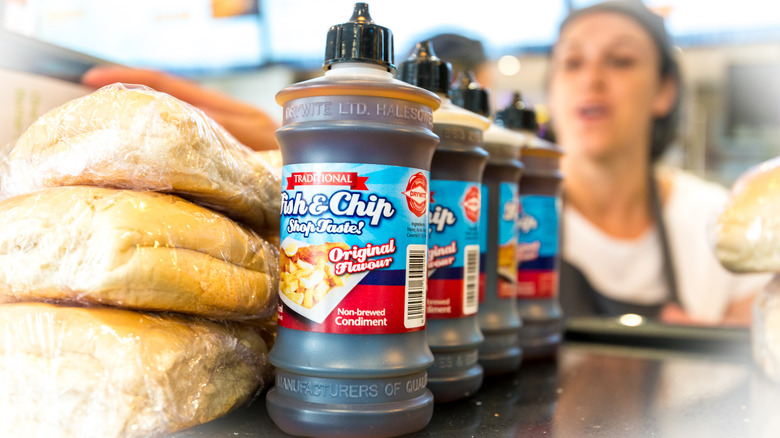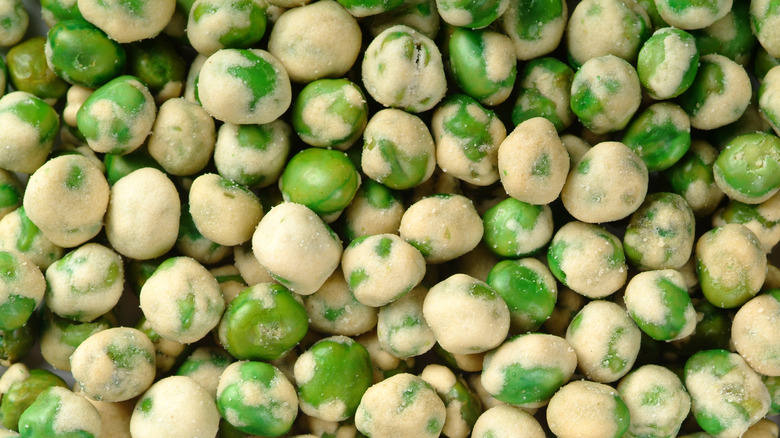Fish And Chips Aren't Served With Real Vinegar In The UK
It is a semi-universally acknowledged truth that of all the things England is known for (the royal family, phone booths, famous playwrights, David Beckham), food is pretty low on the list. There are, of course, some notable exceptions — we love a shepherd's pie, a plate of bangers and mash, and a full English breakfast, which is by all accounts an excellent way to start the morning. Otherwise, many would argue that the national cuisine of the land across the pond leaves something to be desired in both appearance and boldness of flavor.
This makes condiments, which can lend brightness to otherwise heavy foods, a non-negotiable part of any British meal. With its A.1.-adjacent tang, a dollop of HP sauce (otherwise known as "brown sauce") is welcome on just about anything. But when it comes to fish and chips (or just chips on their own), it's vinegar all the way. Well, sort of. In reality, that bottle of amber liquid that pub-goers douse over their dinner isn't technically vinegar at all.
Would you like some non-brewed condiment with that?
In 2017, YouTuber Tom Scott racked up 3.9 million views for a video that called the vinegar sold in fish and chip shops — specifically, malt vinegar — "fake." While traditional malt vinegar requires a fermentation process that begins by germinating grains of barley (per Masterclass), Scott explains that the "non-brewed condiment," or NBC, is simply a product of chemical combinations, albeit a wildly successful one. With its profile of ethanoic acid and artificial colorings and flavorings, which are often derived from caramel, its taste and hue are almost indistinguishable from the real thing.
This isn't to say fake chip-shop vinegar is bad. For starters, it has the benefit of being halal by virtue of its lack of alcohol, which is not the case for real malt vinegar. Scott adds that some brands of NBC are even free of gluten, which malt vinegar is not. That proves to be the case for Drywite's "Original Flavour" product, which claims to be the U.K.'s number-one NBC and boasts a "traditional fish & chip shop taste" on its logo.
Fake vinegar is not alone
While the generically named "non-brewed condiment" isn't vinegar, at least it doesn't claim to be. The same can't be said for certain other commercially produced foods. The wasabi sold in most North American Japanese restaurants and ready-to-eat sushi sections at chain grocers is a perfect example.
Far from the real wasabi grown in mountainous regions of Japan — which, per The New York Times, are facing a barrage of threats due to issues like climate change and population shrinkage — the green stuff that accompanied your last spicy tuna roll simply isn't it. In reality, wasabi sold by retailers and offered in eateries is usually a combination of horseradish, mustard flour, cornstarch, and green food coloring, per Now This News.
Another example is imitation crab, which, as you can gather from its name, doesn't put up any fronts about its true nature. Bearing a slight resemblance to Munster cheese, the affordable ingredient is a core facet of Chinese American cuisine, starring in dishes like crab rangoon. Not unlike human beings, any food that lays its cards on the table is all right in our book.


